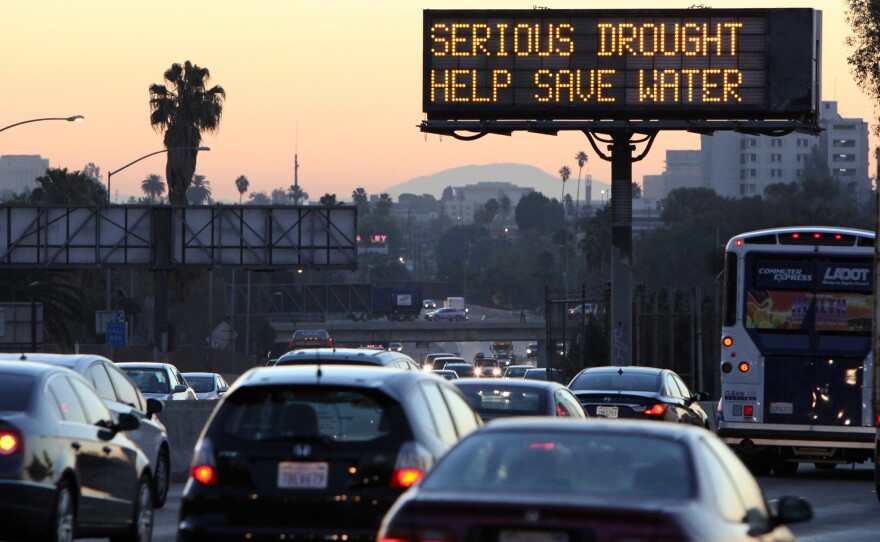What's it going to take to get people to use a lot less water in drought-stricken California, the Technicolor landscape of lush yards, emerald golf courses and aquamarine swimming pools?
Residents may be about to find out as California imposes the first mandatory statewide water-use restrictions later this year.
Gov. Jerry Brown on Wednesday ordered a 25 percent overall cutback in water use by cities and towns, but not farms, in the most sweeping drought measures ever undertaken by the nation's most populous state.
The crackdown comes as California and its nearly 40 million residents move toward a fourth summer of drought with no relief in sight. State reservoirs have a year's worth of water, and with record low snowfall over the winter there won't be much to replenish them. Wells in some parts of the state are going dry as groundwater levels fall.
On Thursday, retired secretary Brenda Johnson stood in the doorway of her Sacramento home contemplating her lovingly tended lawn and azalea bushes. Johnson did not love the idea of brown as the new green.
"With the money I put into it, I don't want it to go dry," said Johnson, who got a warning letter from the city last year for watering her front yard on the wrong day.
"I don't want a dead lawn," she said. "But change is hard, and you do adjust."
In Southern California's sunbathed city of Long Beach, homeowner Katherine Rusconi stood among the bright red, pink and yellow succulents and desert plants that make up her front yard, basking in the knowledge of being ahead of the game.
The city of Long Beach gave her $3,000 in rebates for ripping out her own lawn less than two years ago. Some of her neighbors have since followed her lead, making the block a showpiece of water-saving, wildlife-friendly yards.
With so much of Southern California a desert climate, "this should have been in place for some time," Rusconi said of the restrictions.
Brown's move to get tough on water use came after his push for voluntary conservation yielded mixed results. Asked by Brown in January 2014 to cut their water consumption by 20 percent, Californians achieved only about half that.
Affluent Southern California communities with lots of landscaping on automatic timers were some of the worst offenders, topping 300 gallons of water per person a day compared with 70 gallons for some San Francisco Bay Area communities.
State water officials will now draw up the emergency regulations to carry out the governor's order and hope to have them ready for enactment in May, said George Kostyrko, spokesman for the state Water Resources Control Board.

The governor's order requires the roughly 400 water agencies around the state to cut water use by one-quarter from the 2013 level. The state government is also ramping up a water conservation campaign that will include billboards and radio messages through the end of June.
Homeowners will get rebates for replacing lawns with greenery more suited to the semi-arid state and for installing more water-thrifty appliances and plumbing fixtures. The state also will press water agencies to impose higher, graduated rates to discourage water guzzling.
Cemeteries, golf courses and business headquarters must cut back significantly on watering the grass and shrubs. And new homes will not be allowed to use drinking water for irrigation unless they have water-stingy drip systems.
Homeowners and water districts that violate the rules will be subject to fines, but many of the enforcement details have yet to be worked out.
State water officials stress it's the lush, green blades of grass they are after.
"When it is all said and done, what we are asking is that they cut back dramatically on their outdoor watering," Kostyrko said.
Californians should water enough to save their trees, water board head Felicia Marcus said, but should let their lawns go the way of all mortal things.
In Sacramento, Goud Chetan has already scalped his front lawn, leaving it bare dirt Thursday. Chetan said he will lay down gravel and shrubs instead, though not necessarily to be a good citizen during the drought.
"Really it's about the water bill and saving money," Chetan said.
Some water experts and economists are dubious the crackdown will succeed.
Californians will embrace saving water if they feel everyone is doing the same, water experts said. Brown's cutback order, however, exempts agriculture, which consumes 80 percent of all the water that Californians use.
"In times of scarcity, human nature is to do one's share if you think others are making similar sacrifices," said Jonas Minton, a former senior state water official, now an adviser to the California-based Planning and Conservation League policy group. "When it appears others are taking more than their share, it can be reduced to every person for themselves."
But farmers have already done their part, fallowing land and paying more for water, said Shawn Stevenson, a farmer in California's agricultural heartland, the Central Valley.
Stevenson said he had to rip out nearly half his almond, pistachio and citrus trees.
"It's nice to know that some of our fellow state residents are going to share in the pain," he said. "Why they didn't do it last year, I don't know."







